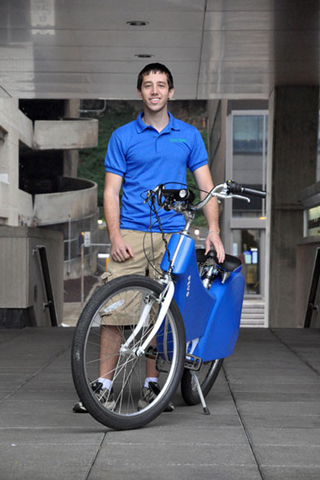Society Alumnus Micah Toll Builds on His Intel ISEF Experience in Pittsburgh
Micah Toll (DCYSC 2000, 2002; Intel ISEF 2006 and 2007; STS 2007 semifinalist) invented a building material that could revolutionize the way we build buildings. He recently shared his thoughts on Intel ISEF, his project, and what he is up to now at the University of Pittsburgh.

What are your memories of Intel ISEF?
I attended two [Intel] ISEFs, the 2006 in Indianapolis and the 2007 in Albuquerque. Both were incredible experiences for me in terms of shaping me as a scientist and engineer. The ISEF is an almost overwhelming collection of the brightest students in the world, each sharing their own specific research and fields of study. While I enjoyed viewing the other projects in my category of Engineering, I also loved walking around the other categories and learning about things I never knew existed. Students my age were doing research in every possible field imaginable and it was such an amazing experience to get to see all of this intellectual capital brought together in one place.
Oh, and being at trackside for the qualifying for the 2006 Indianapolis 500 wasn’t too bad either…
Can you tell me a little bit about your project?
For my project I worked on research and development of a portable construction beam that could be used to build life-saving, rapid deployment shelters for remote areas of the world. The idea was to design a new type of material that could be quickly and easily shipped all over the world after natural disasters or used in refugee situations. My solution was a new type of construction beam made of plastic and foam that was light enough for children to use, easy enough to cut and build with so that it didn’t require power tools, but could support thousands of pounds. I eventually founded a R&D company, Disaster Rebuilding Solutions, to continue work on the beams.
How has doing research when you were young affected your career trajectory?
It has defined my career trajectory and helped me to be a better engineer. I work with fellow engineers all day, and have found that many engineering students these days have made it through their education without learning or utilizing the scientific method. This means they are often missing important results because they haven’t learned how to structure their experiments. By doing research when I was young I was able to learn valuable skills that have helped me to better comprehend and analyze my own engineering innovations by ensuring that I can control variables and really understand what my experiments and data are telling me.
Can you tell me a little bit about what you are up to now?
I recently founded an electric vehicle startup, Pulse Motors, with two of my classmates from the University of Pittsburgh. We are currently manufacturing a fleet of the first vehicle we have designed, the two wheeled Personal Electric Vehicle Zero, or PEV0, as we like to call it. The vehicle is similar to an electric motorcycle but with functional pedals that allow someone to pedal it as well, if they wish. We are building vehicles here in Pittsburgh and seeking funding to expand our operations and continue R&D on our next generation vehicle slated for release in 2013.
Final thoughts:
I think the biggest benefit I’ve had from [my] early scientific and engineering background is how to think outside the box and be creative. Sometimes things simply don’t work; that’s life. Those who know how to adapt their procedures or find creative ways to solve problems and fix experiments are innovators in every sense of the word and have the skills to be very successful at what they do. I never take for granted that I had great teachers, mentors, and parents that taught me the value of science, technology, and education from a young age and have helped me to achieve the success I have today.
- Get involved with the Intel ISEF 2012 in Pittsburgh
- Learn more about the Society Alumni Program


